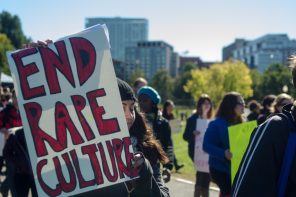Content Warning: This article addresses sexual assault, harassment, and other related forms of violence. The information provided may be sensitive or emotionally triggering to some.
Kicking off today, the Office for Sexual Violence Response, Support and Education (O-SVRSE) is putting on their #ConsentMcGill campaign until October 5. In its fourth year, the campaign has expanded to span two weeks of events which address consent in not only sexual relationships, but day-to-day life as well. The Bull & Bear had the chance to sit down with Bianca Tétrault, the Sexual Violence Education Advisor of O-SVRSE, and discuss this year’s campaign.
The Bull & Bear (B&B): First, what is your role at the Office for Sexual Violence Response, Support and Education (O-SVRSE)?
Bianca: My title is ‘Sexual Violence Education Advisor.’ I’ve been at McGill for four years and my work was housed under Consent McGill, and a lot of people know me on campus through the work that I do under that name. My role is to develop educational material for students, staff, and faculty at McGill. I do trainings on consent and alcohol, how to respond to disclosures, and I run a ‘becoming an active bystander’ workshop, I was also the founder of the website that we have and all our social media platforms. Now that the office is open, I have a new colleague, her name is Émilie Marcotte, and she is the Sexual Violence Response Advisor. This office has now grown to do direct support for people impacted by sexual violence, crisis management, support with reporting at McGill or to the police, and accessing emotional or medical support. We also have a volunteer team that I oversee. Essentially, they’re the backbone of the campaign: they run all of our workshops [as] studies have proven sexual assault prevention education is best done peer-to-peer, so it’s partly why it’s crucial for us to have a peer education team.
B&B: Would you be able to give an overview of #ConsentMcGill?
Bianca: Our main event is our closing event, which is the play Persephone Bound on Thursday October 5 at 7pm and is free for all McGill students, staff, and faculty. It’s an aerial play and one-woman show which focuses on a student’s experience of sexual assault and how difficult it can be coming forward and being believed. There’s also a panel discussion, or more a talk-back, where we’ll have professionals from the community come and speak to sexual violence, identity, intersectionality, power dynamics, and resources, so that we have an in-depth conversation on how to break down some of barriers for survivors. We are hosting a closed workshop on Monday October 2 for survivors of sexual assault to talk about intimacy after sexual violence and anything really that they wish to talk about. It’s being led by a sexologist with 10 years worth of experience in the field. We also have a ‘Self Expression Through Art’ workshop, open to anybody in our community who has experienced difficulties or just needs a self-care space done with an art therapist. We have our open house on Monday October 5 – there will be free food – and because this is a new space off campus, we want people to know where we are. We do a lot of different things other than crisis management, and if people want to get involved this is their opportunity to come check out who we are.
B&B: What role does the Consent McGill campaign play in O-SVRSE as a whole?
Bianca: It’s our signature event of the year: it allows us to showcase different parts of the work we do. We don’t just do consent education, we don’t just do crisis management, we do a ton of things. There are so many things to talk about when we talk about creating healthy, respectful relationships.
B&B: What are the goals of this year’s #ConsentMcGill campaign?
Bianca: This year’s goals are to expand the conversation. The first year or two we held this event, it was really creating the foundation of what is consent in sexual activity and day-to-day life… but there’s so much more to that. Consent doesn’t happen in isolation. It happens through conversation, through understanding ourselves, our bodies, our boundaries. Then it expands to ‘how do we support people,’ or ‘how do we take ownership when we’ve done something wrong.’ The campaign this year focuses on effective responding to disclosures, and understanding the nuances of sexual violence and trauma in the body.
B&B: Who is this campaign for?
Bianca: Originally it was for students but now it’s for everybody. We have staff coming to our events – shout out to McGill Security who are coming out as well to learn more about sexual violence and the impact it has on people – so it’s for everybody.
B&B: Are there any specific events you’re excited for?
Bianca: All of them! They’re all great and they all bring something different. The self-care corner, for example, it’s where we want to talk about wellness, about grounding yourself in the present. If you’re having a tough week or even it’s too much to hear what we’re talking about from the campaign, come and just sit with us. Do some potting, do a walking tour, learn the different resources, come to a workshop, learn how to effectively support someone, and definitely the play. The play!
B&B: Are there other ways you haven’t yet touched on; on how this year’s campaign builds on previous #ConsentMcGill campaigns and on the Office’s previous work?
Bianca: Pushing the envelope on our conversations. I think the community is ready now to go further than just talking about consent. Although, as much as sometimes groups say they already know about consent and events occur, it always goes back to “but you still didn’t understand consent.” So as much as we can go further in our conversation, we still have to maintain the foundational conversations.
B&B: Are there any other big plans or campaigns that the Office is working on for the semester or school year that you can share with us?
Bianca: We are hosting sex trivia night in collaboration with AIDS Community Care Montreal and Healthy McGill in residences October 11 and again at Gerts, date to be confirmed. We do a whole bunch of workshops throughout the semester, so check us out on myinvolvement and our Facebook page. In the winter, we’re gonna run another two-week event as well. In the next month we’re also launching a podcast, called ‘Taking it all Off.’ This is a sex-positive podcast co-hosted by myself and Charlene from Rez. We’re going to talk about everything related to relationships, sex, for students and by students. Although we’re hosting it, all our invited guests are your everyday, expert students.
B&B: Is there anything else you wish to add about the campaign or the office?
Bianca: I just want to say a really big thank you to all of our community members who’ve been supporting my work throughout the past few years. Everything I do is in collaboration; I have so much student support, [and support from] other services on campus, which helps make this event bigger and bigger each year. I’ve really seen a shift in culture in the last three years: people are interested in the topic, people are stopping at our tables saying “thank you, I’m glad you’re here,” and it means so much to us. But the biggest thing is to come talk to us, come meet us. Our work is for the community created with the community – we can’t do this without you.
–
You can find the Office for Sexual Violence Response, Support and Education at 550 Sherbrooke O. Suite 585 (west tower elevators 1-11). Their drop-in hours are Tuesdays 9-11 a.m. and Fridays 10 a.m.-1p.m. The office can also be reached by phone at 514-398-3786 or 514-398-4486, or by email at svoffice@mcgill.ca.






